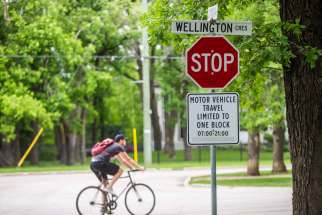Less gambling, more science can trump Delta
Read this article for free:
or
Already have an account? Log in here »
To continue reading, please subscribe:
Monthly Digital Subscription
$0 for the first 4 weeks*
- Enjoy unlimited reading on winnipegfreepress.com
- Read the E-Edition, our digital replica newspaper
- Access News Break, our award-winning app
- Play interactive puzzles
*No charge for 4 weeks then price increases to the regular rate of $19.00 plus GST every four weeks. Offer available to new and qualified returning subscribers only. Cancel any time.
Monthly Digital Subscription
$4.75/week*
- Enjoy unlimited reading on winnipegfreepress.com
- Read the E-Edition, our digital replica newspaper
- Access News Break, our award-winning app
- Play interactive puzzles
*Billed as $19 plus GST every four weeks. Cancel any time.
To continue reading, please subscribe:
Add Free Press access to your Brandon Sun subscription for only an additional
$1 for the first 4 weeks*
*Your next subscription payment will increase by $1.00 and you will be charged $16.99 plus GST for four weeks. After four weeks, your payment will increase to $23.99 plus GST every four weeks.
Read unlimited articles for free today:
or
Already have an account? Log in here »
Hey there, time traveller!
This article was published 15/06/2021 (1638 days ago), so information in it may no longer be current.
Manitoba may have lost the race against the B.1.1.7 variant that crippled the province’s hospital system and caused nearly 100 deaths this year, but it still has a chance to beat the newer Delta (B.1.617.2) — if government plays its cards right.
The Pallister government did not play its cards right in April, when it knew how rapidly B.1.1.7 was spreading in Ontario and Alberta. It refused to bring in stricter measures to contain the more contagious novel coronavirus strain, despite repeated calls from experts to do so.
The results were catastrophic, including 22 COVID-19 deaths over the past week. As of June 15, there were 97 deaths in Manitoba tied to the B.1.1.7 variant.
Manitoba had by far the highest per capita COVID-19 deaths in Canada during the first two weeks of June.
Emergency wards and intensive care units continue to struggle to keep up with admissions of COVID-19 patients. Manitoba was the only province forced to airlift critical care patients to other jurisdictions for treatment.
All of that was the direct result of the Pallister government’s response to the pandemic’s third wave.
Government gambled it could vaccinate enough people, particularly those over age 70, to prevent large-scale hospitalization and death. It lost, and a lot of people died.
It now has to decide how it plans to respond to the Delta variant, which is not only more contagious than B.1.1.7, it’s more resistant to a single dose of the COVID-19 vaccine. (Two shots of the vaccine are required for full protection.)
Government gambled it could vaccinate enough people, particularly those over age 70, to prevent large-scale hospitalization and death. It lost, and a lot of people died.
That poses a challenge, since only 18 per cent of Manitobans aged 12 and over have received two doses. Demand is strong and supply is growing rapidly, but it will take many weeks (perhaps two to three months) to get enough people fully immunized to prevent Delta from overwhelming hospitals.
In the meantime, the only way to control it is through public health measures.
If government eases restrictions too quickly, Manitoba could be hit with a fourth wave.
What adds to the complexity of the decision making is public health officials still don’t know how contagious the Delta variant really is, or how resistant it is to a single dose of the vaccine. If they underestimate its strength, the results could be deadly.
Manitobans still don’t know the details of the Pallister government’s reopening plan.

The province says it is seeking to reopen some businesses with limited capacity based on vaccine uptake. However, the plan released last week is so vague, even the business community doesn’t know what the province has in mind.
Government says it plans to ease restrictions Canada Day and the first weekends of August and September, as long as vaccine benchmarks are met and case numbers are “under control.” (The “under control” part has not been defined.)
Manitoba’s case numbers are trending in the right direction. The restrictions put in place in early May are working. Case numbers and the test positivity rate are falling.
Vaccinations are also helping bring those numbers down. Hospitalizations, which are lagging indicators, are beginning to level off. There is no reason cases won’t continue to fall under current restrictions.
The question is: will the Pallister government go back to the gambling table and bet enough people will be vaccinated before the first week of July that the province can ease restrictions in two weeks?
Only about 25 per cent of eligible Manitobans are expected to be fully vaccinated by then. If the Delta variant is as virulent as some experts warn, easing any restrictions at all in two weeks could have serious consequences.
Manitoba’s test positivity rate was still above 10 per cent Tuesday. It seems unlikely it would fall enough by July 1 to consider any significant changes to public health orders, even if daily case numbers drop below 100 by then.
What Manitoba needs over the next few weeks is less gambling and more science. If science wins the day, there’s no reason Manitoba can’t beat the Delta variant.
tom.brodbeck@freepress.mb.ca

Tom has been covering Manitoba politics since the early 1990s and joined the Winnipeg Free Press news team in 2019.
Our newsroom depends on a growing audience of readers to power our journalism. If you are not a paid reader, please consider becoming a subscriber.
Our newsroom depends on its audience of readers to power our journalism. Thank you for your support.






